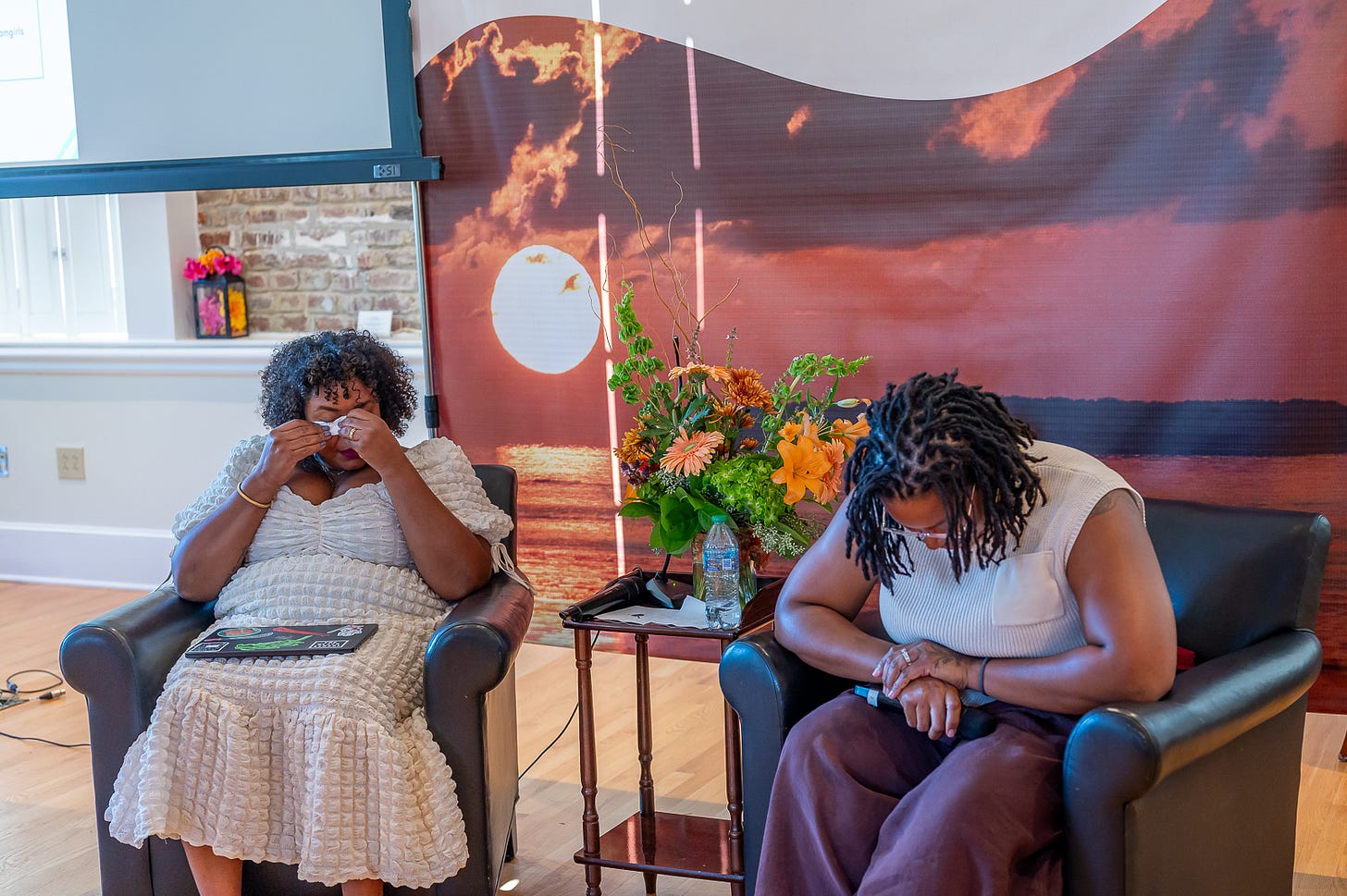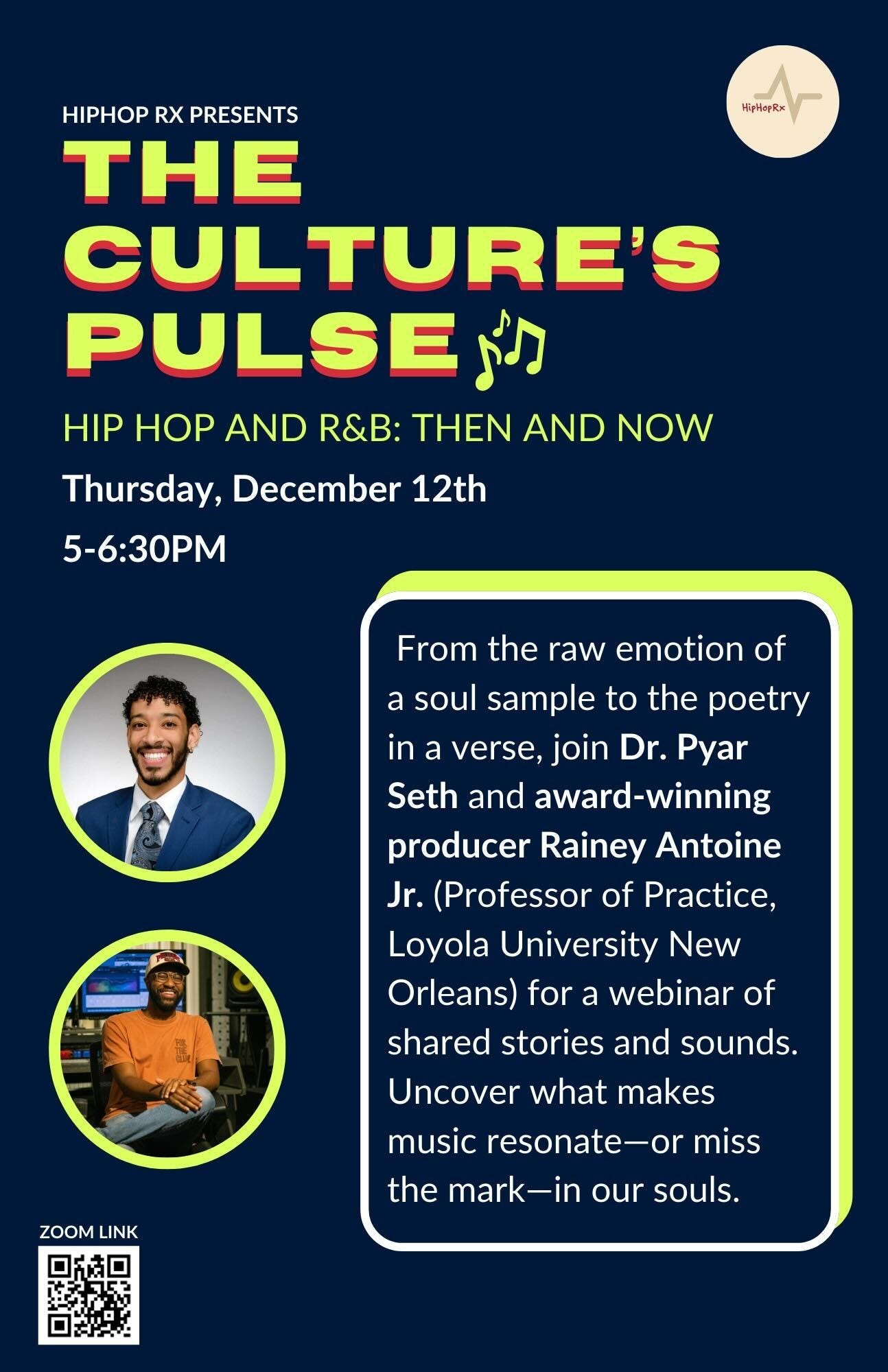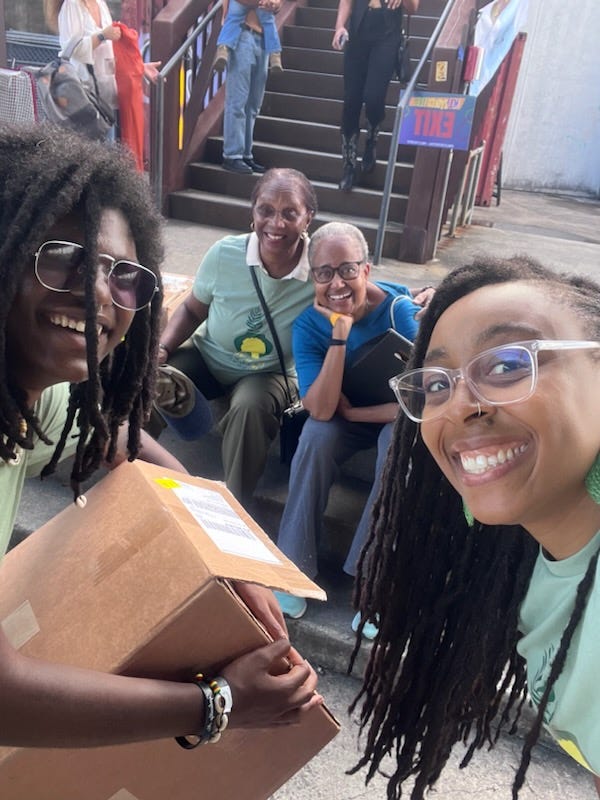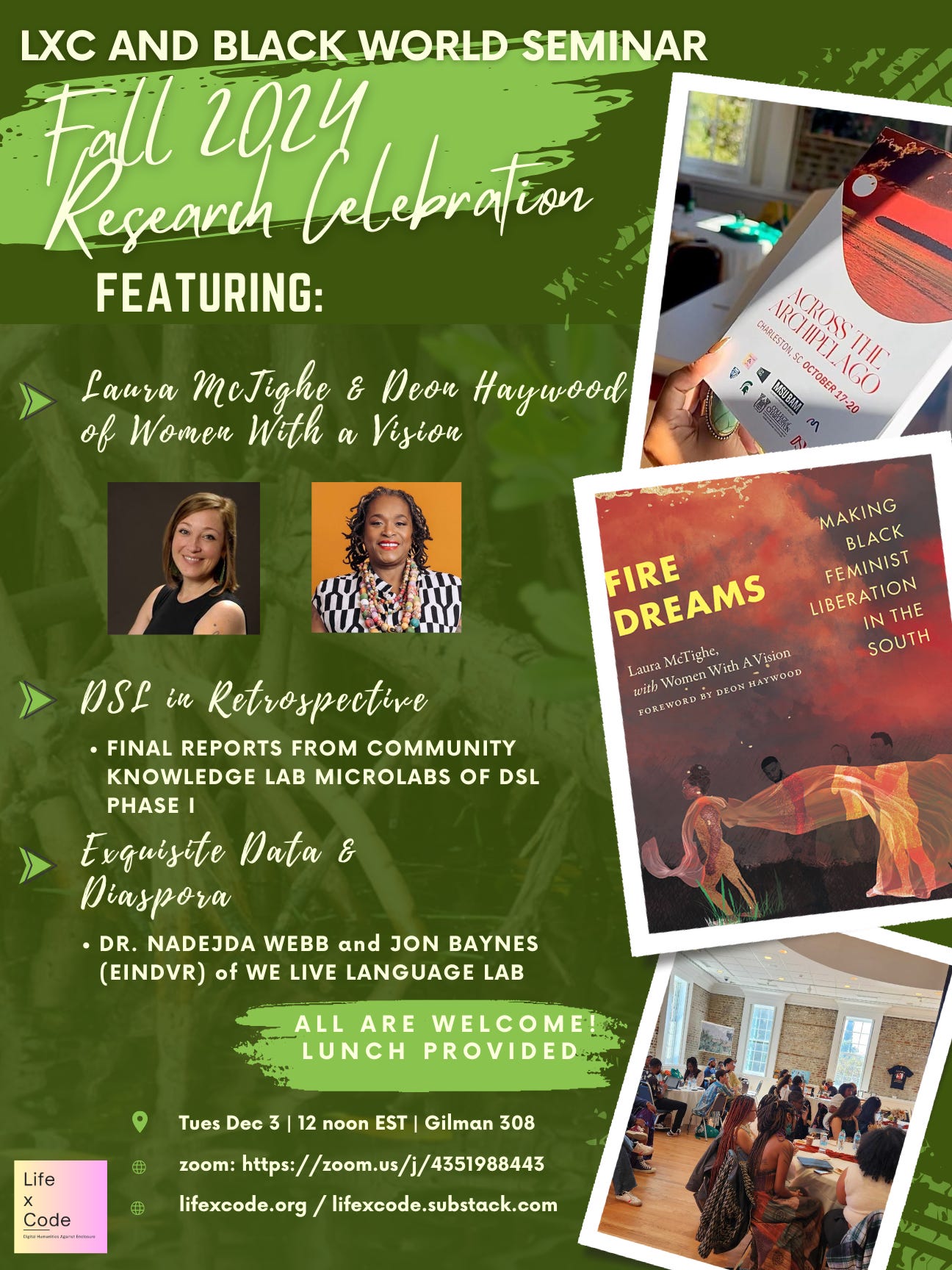Rest in power to the glorious and unapologetic Nikki Giovanni as well as to all of our beloved who have joined the ancestors this fall and winter.
Love & Grace: From the Desk of Director Dr. JMJ
If there is one memory that is going to stick with me from this last semester of doing digital work against enclosure, it is this one:

Here we sit, co-directors of the Diaspora Solidarities Lab, one of LifexCode’s largest labs, overcome. We have just delivered our “Love Letter to the DSL,” our closing remarks at our closing symposium Across the Archipelago. The election hadn’t happened yet, but genocide had (and still is). We entered the final symposium with battle wounds, exhausted from having attempted to carve a little bit of sanity, care, justice, and ethics from this thing called the academy. We entered unsure of our impact, unsure if it could ever be enough. It took only a few hours there for us to realize how much of a beautiful community we created. We left the symposium flooded with news and updates from our Community and Solidarity Fellows, from artists whose work was featured in the Coastal Relations and Slavery in Motion exhibitions that accompanied the event, and healed from our conversations with each other, with elders like Mr. Leon Waters (Louisiana Museum of African American History) and M. Jacqui Alexander (Tobago Centre for the Study and Practice of Indigenous Spirituality), with youth like filmmaker Sha-shonna Rogers. This was the moment, as I sat beside my boyfriend and radical collaborator, that I knew, the vision was strong, the practice is necessary, and the community will be there to hold us down. We are all we’ve got. We are all we need.
The wave of racial reconciliation that emerged in 2020 with the murder of George Floyd and the impact of the global pandemic on Black communities has crested. As I write, institutions around the country and the world are getting ready for a wave of racial and political backlash the likes of which we have never seen. I remember when I wrote “This really is as bad as we think it is” in 2017 for Bitch Magazine. It is. And also, we aren’t going anywhere. We will continue to do antiracist and decolonial work—whether digital, analog or everything and anything else we can do for our communities—until the wheels fall off.
Against Enclosure, Against Fascism, Against Empire
“Fire dreams” are quite literally born in flames.”
For My Nani, For My Ghosts: From the Desk of Assistant Director Dr. Nadejda I. Webb
During the LxC Fall 2024 Research Celebration, I was able to share the groundings of an emergent project, Beyond a Haunting. In concert with Jon Baynes, BaH queries the relationship between histories of indenture and belonging to understand how descendants of indenture are grappling with this positionality. What can small data tell us about the quotidian impacts of limited scale representation in the aftermath of trauma and erasure? How are descendants writing/striking back to/at empire?
The little self who dwells within me now, who held her Nani’s hand and wondered why they seemed so gentle, was tremendously excited to say her name, to cite her as one catalyst of this project.
“Aisha ‘Doris’ Baksh Persaud. She was born in Wakenaam, Guyana and was a child of indenture.”
When she transitioned at the outset of the Covid pandemic, I was at a loss. I planned to gather four generations in one room, to sit with her and my mother and my child and ask the many questions only she could answer.
She cannot be reduced to the experiences of indenture. Yet her death during the outset of the Covid pandemic, her unexpected disappearance, transports me back to our other disappeared, to the many ways in which their presence and absence ask us as descendants to grapple with who we are, now.
As we analyze social media data, we use the cutlass as a reference point to perceive multiple herstories simultaneously. While “the cutlass highlights the social and intimate relations among indentured Indian women, Indian men, African workers, and their descendants” within the post-emancipation period (Parsard, 242), when put in relationship with the ohrni, a head scarf typically used to demonstrate modesty, in Andil Gosine’s photo essay, “Ohrni and Cutlass,” the cutlass functions as much as a marker of oppression as evidence of the creative agency of women who lived through miserable conditions of colonisation (2). Within the context of Cutlass Magazine, one site of our analyses, we witness the cutlass wielded as a tool for archiving. Founded in August 2020 by Trinidadian Vinay Harrichan in response to a need for “the Indo-Caribbean community and descendants of Indian indentureship to have a space to convene around our culture and history,” CM catalogs cultural artifacts that have emerged out of indenture.
We return to the cutlass to hold the complexity of the Indu-Diaspora as we deliberate and highlight the creative agency of descendants. I return to the cutlass to think about my Nani as I think about data. To hold the ways she wielded it as she worked in the backdam and loved us.

This fall, we have been SURFACING space for celebration, joy and community.
Black Beyond Data
Black Beyond Data was awarded $1.25 million from the Mellon Foundation for Phase III of the Black Beyond Data Ecosystem! Through 2027, Kim Gallon (Brown) and Sayeed Choudhury (Carnegie-Mellon) will be bringing questions health, human rights and AI to questions of Black life, Dr. Alexandre White (JHU) and Zophia Edwards (JHU) will be building a Consortium for Black Data Reimaginings, Nadejda Webb (JHU) and Pyar Seth (University of Notre Dame) will be laying the groundwork for their own labs, the We Live Language Lab and HipHopRx, and Skyy Moorer will continue to lead the Community Data Project at St. Francis Neighborhood Center. We also have a few other surprises in store including the return of the earth-shaking event Who Owns Black Data! This fall BBD has:
hosted five Black Beyond Data Reading Groups
Relaunched the Black Health Heritage Data Lab
The Black Press Research Collective launched the Black Press at 200 Project
Presented our work on community data at the Sustainable Future Initiatives Meeting at the Brookings Institute
Keywords for Black Louisiana
Keywords for Black Louisiana celebrated the launch of its Scholarly Editing microedition, the launch of its public beta with a launch party fit for a Gulf Coast/Caribbean/African celebration, and the continued support from NHPRC in 2025!!!!
Check out our Keywords for Black Louisiana Public Beta: Document and Story Sites
Keywords for Black Louisiana Scholarly Editing microedition is live!
Another successful call for new Transcriber/Translators (2T) and Digital Assistants for Editorial Markup (DAEMs).
Keywords welcomed new Digital Curation and Community Engagement Fellows in Zaria El-Fil (University of Chicago) and Cyntoya McCall (Tulane).
Nyla Williams (XULA, c/o ‘24) launched the Teaching Black History Program with support from Dr. Shearon Roberst (XULA)
Cyntoya McCall led the formation of our K4BL Public History Fellows team (our “street team”), which hit the ground running this fall tabling at Black Love Fest and Zydeco Fest. K4BL alum Chenise Calhoun even came back to support!
Diaspora Solidarities Lab
Hosted the closing symposium Across the Archipelago at the Avery Research Center
Executed our second Rememory Lab, this time in New Orleans with the Black School which just started construction on its schoolhouse!!!
Remains // An Archive shared their work at Vincent Brown’s History Design Studio at the Hutchins Center at Harvard and is organizing an event, Slavery in Motion, at the Baltimore Musem of Art on January 16, 2025.
Black Louisiana History Incubators tabled and shared the gifts of SF Felli Maynard at Black Love Fest and at the Community Book Center in Tintype Portrait days.
Taller Entre Aguas hosted its first Black Puerto Rican Studies writing workshop, Olas de Memoria, with scholars, artists, and activists from the diaspora and the archipelago. Our special issue, Olas de Memorias, with Centro: The Journal of the Center for Puerto Rican Studies is under review now!
Archipelagos of Marronage completed its Storymap teaching how to engage runaway slave ads in Louisiana; forthcoming as part of the Open Classroom for New Orleans Culture (PI: Bryan Wagner)
Translation Lab members presented their first forays in exploring implications for translation, the digital and African languages at Across the Archipelago.
Black Testimony Project presented their research on Ophelia Settle Egypt in posters at Across the Archipelago
Ecosystem-Wide
Welcome Dr. Nadejda Webb as Assistant Director!!!! Dr. Webb hit the ground running, creating gather spaces after the election, hosting weekly co-writing sessions, meeting with members across the ecosystem, and designing our monthly Vision & Practice LifexCode meetings.
JHU Digital Humanities Workshop: We were thrilled to co-sponsor the Digital Humanities Workshop, which is co-led by E. G. Palazzolo and Dr. Emily McGinn. This fall the DHW hosted Dr. Nadejda Webb, Ellie Palazzolo, Jessica Newby, Craig Messner, and Myra Cheng.
Fall Research Celebration welcomed Dr. Laura McTighe and Deon Haywood of Women with a Vision to the space to share their history doing the work even as the world burns down.
LxC members presented on over eight panels including at the American Studies Association, at the TEI conference in Argentina, at the Puerto Rican Studies Association meeting, and at African Studies Association.
Publications/Awards
Kim Gallon, “The ‘Diet Soda’ of Data,” Public Books (blog), September 18, 2024, https://www.publicbooks.org/the-diet-soda-of-data/.
Brooke Lansing Mai, “‘The Helpless French Girl’: Seduction Narratives in a Nineteenth-Century Abortion Trial,” Gender & History 36, no. 2 (2024): 313–26, https://doi.org/10.1111/1468-0424.12795.
Brooke Lansing Mai won the 2024 SHEAR Best Dissertation Prize for her dissertation “With the Strictest Confidence: Abortion in Nineteenth-Century New York City”
Jessica Leigh Hester, “‘“We the People” Would Soon Decide for Them’: Grave Robbing and the Black Press in Nineteenth-Century Philadelphia,” Nineteenth Century Studies 36 (November 11, 2024): 55–79, https://doi.org/10.5325/ninecentstud.36.0055.
Daniel Morales-Armstrong published “Liberto Refusal Strategies in Response to the Post Abolition Contract Mandate (1873-1876),” Voces de Liberatd: El Sesquicentenario de la Abolicion de la Esclavitud en Puerto Rico (1873-2023)
Daniel Morales-Armstrong received two dissertation awards: Puerto Rican Studies Association's 2024 Virginia Sanchez Korrol Dissertation Award and the Best Dissertation Prize from his home instution the University of Pennsylvania
Essah Diaz received the Joan Fayer Award for Oustanding Ph.D. Student fro University of Rio Piedras
Lauren Tilton, David Mimno and Jessica Marie Johnson published Computational Humanities in the Debates in the Digital Humanities series
LifexCode co-founder Dr. Christina Thomas received the 2025 Mississippi Humanities Council Public Humanities Scholar Award










